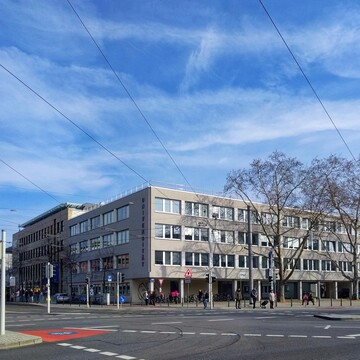Master's in Culture and Economy: History
Program facts and information
Degree: Master of Arts (M.A.)
Standard period of study: 4 semesters (2 years)
ECTS credits: approx. 120
Language of instruction: German, English
Language requirements: German (click here for further information)
Program start: Fall semester (September) and spring semester (February)
Academic calendarSchool: School of Humanities
Semester fee: EUR 194 (more information)
Tuition fees for international students from non-EU countries: EUR 1,500
Tuition fees for a second degree: EUR 650Program overview
Students enrolled in the master's program in Culture and Economy can build on the expertise they have acquired in the bachelor's program and enhance their knowledge of Cultural Studies and Business Administration or Economics.
Usually, two thirds of the master's program consist of the major in History and one third of the combination major in Business Administration or Economics:
The major, History, includes a two-semester project module that is carried out in collaboration with non-university partners who are specialized in communicating scientific findings in History to the public. Thanks to the wide range of topics and courses offered by the Department of History, the module Regions, Nations and Worlds offers students the opportunity to choose their own specializations depending on their individual research interests.
Students of the master’s program in Culture and Economy take a specialist subject and, depending on their prior knowledge, can either opt for Business Administration or Economics. If they study Business Administration as a specialist subject, they can choose from the modules in the areas Marketing and Management. If they study Economics as a specialist subject, they broaden their basic knowledge of this field by taking advanced courses offered in the Economics program. After in-depth study of these subjects, our graduates are equipped with a range of useful skills in these fields.
Students of the master's program in Culture and Economy: History can apply for the new specialization option Global Sustainability Management, thereby expanding their humanities profile with future-oriented sustainability skills. The certificate program will start in the spring semester of 2026.
Why study Culture and Economy: History at the University of Mannheim?
The combination of Cultural Studies with a qualification in Business Administration or Economics to form one degree program is unique in Germany. As such, graduates of our master’s program, with their knowledge of two different fields, are particularly sought-after on the national and international labor market.
Because the groups at the School of Humanities are small, students are provided with personal support by the academic advising team and the program managers, and also benefit from a close relationship with professors and teachers.
The Humanities at the University of Mannheim have an excellent reputation both in Germany and abroad. The University of Mannheim is also one of the leading institutions in Germany for Business Administration and Economics (take a look at the rankings). With 450 partner universities, and students from 100 countries, Mannheim is one of the most international universities in the country, and provides students with an inspiring learning environment that facilitates excellent teaching and research.
Career opportunities
Graduates of the master’s program in Culture and Economy know and understand economic concepts and processes. That is why they are particularly in demand in roles that require both cultural awareness and expertise in business administration and economics. They work, for example, in PR and corporate communication, marketing and sales, HR and consultancy services, but also in cultural and event management, editorial departments, and federal and state authorities.
A degree in History also qualifies you to work in museums, archives, or in business journalism.
Apart from that, graduates can also pursue a doctorate in History and aim for a career in academia.
Required interests and skills
Students of the master’s program in Culture and Economy: History should
- be interested in history, ranging from ancient history to modern history,
- enjoy interpreting sources,
- have a pronounced interest in economic topics,
- be able to think critically and adopt multiple perspectives,
- like discussing topics,
- have intercultural competence,
- have a high level of motivation and willingness to work independently and in a targeted manner,
- enjoy writing academic texts.
Program structure
Module catalog
You can find further details on how the program is structured in the module catalog.Studying abroad
Studying abroad is optional. However, due to the program’s intercultural orientation, students are encouraged to spend a semester abroad. Master’s students can structure the program to suit their individual needs, which allows them to flexibly integrate a semester abroad into their studies. The School of Humanities is partners with over 140 universities worldwide, and – in collaboration with the International Office – can help you plan a period of study abroad.Internships
According to the examination regulations of the program, students do not have to do an internship during their studies. However, master’s students can plan their studies in such a way that voluntary internships can be integrated into their program of study flexibly and on short notice. If you have any questions, do not hesitate to contact the program managers. They will also help you find a suitable internship.Continuing Education
Certificate programs
Strengthen your potential, deepen your knowledge, find solutions for challenges we will face tomorrow – there are many good reasons to think outside the box, get to know and try out new things even during your studies.At the University of Mannheim, you can do this in the “Studium Oecologicum” which focuses on sustainability. In our certificate program, you will acquire interdisciplinary expert knowledge which can help you to act ethically and to make holistic decisions.
Language courses
Making language learning easier: No matter if you want to learn Japanese, Hebrew, Spanish or Norwegian, take the Graduate Record Examination Test (GRE), The European Language Certificates (telc) or the TOEFL test – each semester, the University of Mannheim offers language courses and language certificates in more than 16 languages for students and non-university members, online and on campus!Studium Generale
Are you interested in IT or communication trainings or theater, music, or drawing courses? Studium Generale has a vast range of courses available to all.Doctorates
Successful graduates of the master’s program in Culture and Economy can pursue a doctorate at the School of Humanities. The program managers will provide you with information on your options.
Doctoral programs and opportunities at the School of Humanities
General information on doctoral studies at the University of MannheimAdmission requirements and selection
In our selection process, we take numerous criteria into account. For more details, please check the selection statutes (see below). Be bold! Please do not hesitate to contact us if you need advice. We are looking forward to receiving your application!
Admission requirements
If you have not yet completed your bachelor’s degree, you may still apply for a master’s program as long as will provide a proof that you have obtained at least 135 ECTS credits.
- Completion of a bachelor's program in Culture and Economy: History or a program in the Humanities, Business Administration or Economics recognized as equivalent, completed with a grade of “good” or better (equivalent to the German grade of 2.5) at a German higher education institution or abroad (also Berufsakademie), corresponding to at least 180 ECTS credits or a standard period of study of at least three years
- Depending on the combination major, the program must have courses in Business Administration or Economics corresponding to at least 36 ECTS credits and courses in History corresponding to at least a basic and an advanced module or equivalent courses in the core subject History
- If you do not have the knowledge in History, you can still apply, since you can acquire the required knowledge in History later on.
- Depending on the combination major, the program must have courses in Business Administration or Economics corresponding to at least 36 ECTS credits and courses in History corresponding to at least a basic and an advanced module or equivalent courses in the core subject History
- Proof of proficiency in German
Selection criteria
The selection criteria are irrelevant since this program of study is currently not selective.Selection statutes
Under “Admission requirements and selection” we have compiled the most important selection criteria of the program for you. For more detailed explanations of the selection process and the legally binding requirements of the degree program, please refer to the selection statutes.- Completion of a bachelor's program in Culture and Economy: History or a program in the Humanities, Business Administration or Economics recognized as equivalent, completed with a grade of “good” or better (equivalent to the German grade of 2.5) at a German higher education institution or abroad (also Berufsakademie), corresponding to at least 180 ECTS credits or a standard period of study of at least three years
Application
Scholarships and funding
The university offers various funding opportunities. Around 200 Mannheim students receive scholarships every year, which are intended to give them the freedom to focus on their academic achievements or to continue their voluntary work alongside their studies. Find out more about the funding opportunities and feel free to apply, for example, for the Deutschland Scholarship, the Opportunity Mannheim Scholarship or the Elite Sports Scholarship Rhine-Neckar Metropolitan Region.Funding opportunities for international degree-seeking students
Application deadline
The application deadline for fall semesters starts on 1 April and ends on 31 May.For the spring semesters the application is possible from 15 October until 15 November.
Learn more about the School of Humanities
Contact

Aline Schmidt
School of Humanities
Schloss – Room EO 287
68161 Mannheim
Wed 10am-noon – online and in person consultation hours
Please book an appointment via https://www.phil.uni-mannheim.de/en/consultation-hours-masters-programs/
During the semester additional drop-in consultation hours in EO 287, Tue 10am–noon
Individual appointments via email.

Admissions Office
L 1, 1 – Room 157, 158
68161 Mannheim

